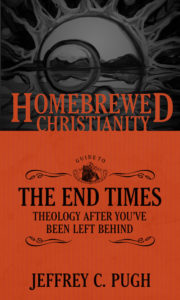 Theology After You’ve Been Left Behind
Theology After You’ve Been Left Behind
Many have long held fast to the promise of Jesus’s return, with believers increasingly convinced their generation is living among the last days. In The Homebrewed Christianity Guide to the End Times, Jeffrey C. Pugh uses his own stint in an apocalyptic cult to examine how Christianity and society at large have become preoccupied with the theology of dispensationalism. Through a bold reading of biblical texts and church history, Pugh sheds light on the harm this belief has on Christian engagement with the world, revealing a darkness unrestricted to the last days.
In an excerpt provided by Fortress Press, Pugh writes:
“Apocalypse. Armageddon. The Eschaton. Springing from our fascination with The End, a storehouse of images permeates our art, literature, and religion. The End is a belief so ingrained within us that the apocalypse is part of the air we breathe, the atmosphere that envelops us…
The word apocalypse doesn’t denote the end of all things, rather it means to uncover or unveil something that is hidden. In apocalyptic literature the curtain is pulled back from the façade of existence so that we can see the reality behind the scenes. It’s like the moment in the Wizard of Oz when the curtain is pulled back to reveal the truth about the great and powerful Oz—he’s just a guy who uses technology to create an illusion of power. Ancient apocalypses from Babylon to Israel worked to show that behind the scenes of everyday life, with its oppressions and violence, God’s reality was far different. These writings revealed that the forces behind the scrim, evil or divine, were a reflection of another, heavenly, reality. This revelation was often ambiguous because when the apocalyptic truth was revealed, confusion entered the picture. An unveiling of evil spiritual forces for some was for others the very system that keeps the world orderly. Revelation of what God thought about society—and God was seldom pleased—called one’s very existence into question.”
For more information on the publication, click here. Continue reading the excerpt with Fortress Press here.
Fellow travelers are scholars, activists, and practitioners that embody the ideals and commitments of the Project on Lived Theology. We admire their work and are grateful to be walking alongside them in the development and dissemination of Lived Theology.
